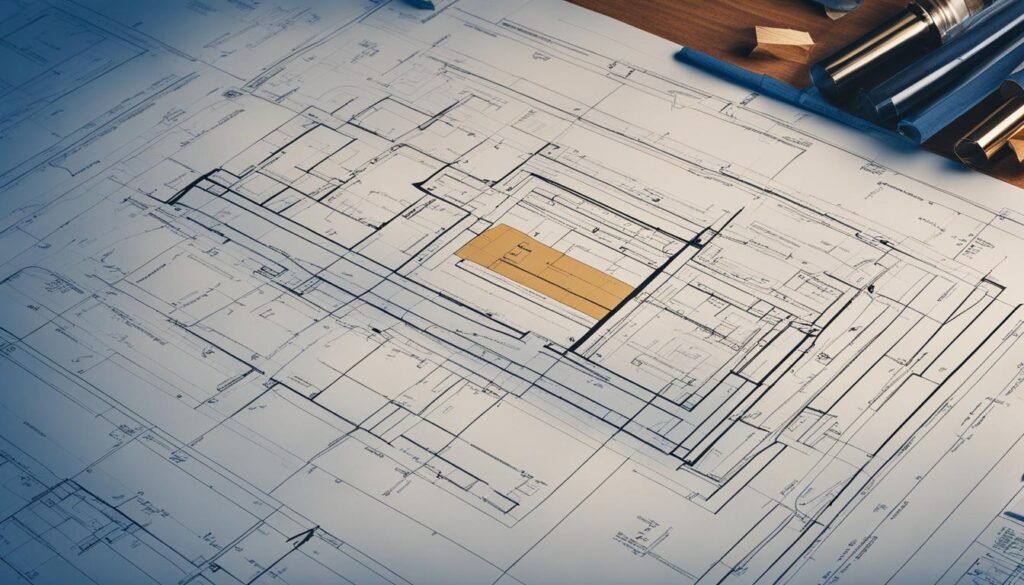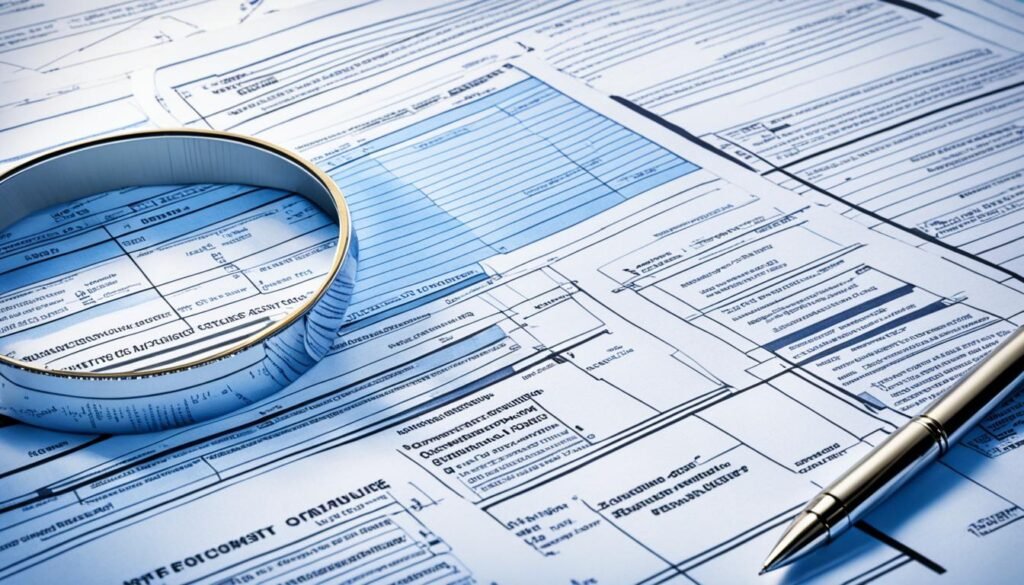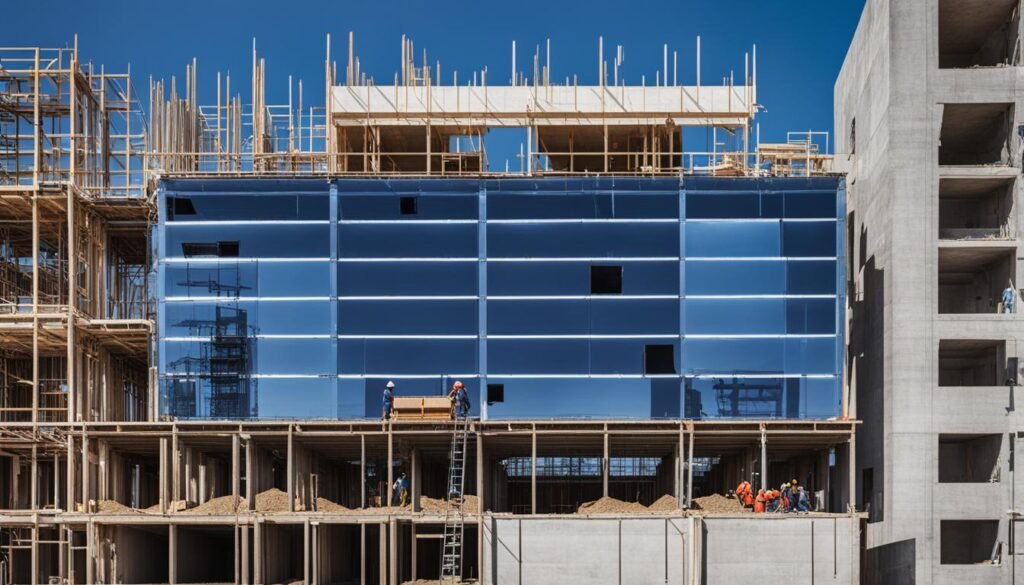When it comes to building your dream home, construction loan rates can have a significant impact on affordability. Securing competitive construction loan rates is crucial for borrowers looking to navigate the complexities of construction loan financing. By understanding the factors that influence interest rates, exploring different types of rates, and implementing effective strategies, borrowers can maximize their chances of obtaining favorable loan terms.
In this section, we will delve into the intricacies of construction loan interest rates and provide valuable insights to help borrowers unlock competitive financing options.
Key Takeaways: Construction Loan Rates
- Understanding the factors that influence construction loan interest rates is essential.
- Different types of interest rates are available for construction loans, including fixed-rate and adjustable-rate options.
- Borrowers should consider their personal preferences and financial circumstances when deciding between fixed and variable interest rates.
- Improving creditworthiness, shopping around for lenders, and negotiating effectively can all contribute to securing the best construction loan interest rate.
- Monitoring and managing construction loan interest rates throughout the building process is crucial for optimizing financial outcomes.
Understanding Construction Loan Interest Rates
When it comes to construction loan financing, understanding the intricacies of interest rates is essential for borrowers. Construction loan interest rates can significantly impact the cost of building a new home or undertaking a construction project. By comprehending the factors that influence these rates and the different types available, borrowers can make informed decisions to secure the most favorable financing options.
Several factors influence construction loan interest rates. Lenders consider the borrower’s creditworthiness, loan-to-value ratio, project type, and prevailing market conditions. Creditworthiness reflects the borrower’s financial history and ability to repay the loan. A higher credit score often translates into lower interest rates, as it indicates a lower risk for the lender. The loan-to-value ratio, which compares the loan amount to the appraised value of the property, also plays a role in determining interest rates.
Market conditions, such as economic stability or fluctuations, impact interest rates as well. During times of economic uncertainty, lenders may adjust their rates to offset potential risks. Staying up-to-date with market trends and consulting with lenders can provide borrowers with valuable insights into the current interest rate environment.
There are two main types of construction loan interest rates: fixed-rate and adjustable-rate. A fixed-rate interest means that the interest rate remains constant throughout the loan term, providing stability and predictability for borrowers. This consistency allows borrowers to budget with more certainty, knowing that their monthly payments will not fluctuate.
On the other hand, adjustable-rate interest loans offer a different structure. The interest rate on these loans may vary over time, typically based on an index such as the prime rate. Adjustable-rate loans often start with a lower initial interest rate, which can provide cost savings in the short term. However, it is important to consider potential rate adjustments and their impact on monthly payments when opting for an adjustable-rate loan.
Understanding the types and factors influencing construction loan interest rates empowers borrowers to make informed decisions and secure the most favorable financing options. By carefully evaluating their creditworthiness, loan-to-value ratio, and the current market conditions, borrowers can navigate the construction loan landscape with confidence.
Next, we will delve deeper into the factors that affect construction loan interest rates. By understanding how creditworthiness, loan-to-value ratio, and market conditions impact interest rates, borrowers can take proactive steps to secure the best possible terms for their construction loan.
Factors Affecting Construction Loan Interest Rates

Creditworthiness, loan-to-value ratio, and market conditions are key factors that lenders consider when determining construction loan interest rates. These factors play a crucial role in assessing the risk profile of borrowers and setting the appropriate interest rates for construction loans.
Creditworthiness: Borrowers’ creditworthiness, measured by their credit history and score, is a significant factor in determining construction loan interest rates. Lenders use credit scores to assess the likelihood of timely loan repayments. Higher credit scores indicate lower credit risk, which translates to lower interest rates.
Loan-to-Value Ratio (LTV): LTV ratio compares the loan amount to the appraised value of the property. It measures the borrower’s equity in the project and the potential risk to the lender. A lower LTV ratio indicates a larger down payment or more equity, reducing the lender’s risk. Consequently, borrowers with lower LTV ratios often receive more favorable interest rates.
Market Conditions: The broader economic environment and market conditions can influence construction loan interest rates. Lenders consider factors such as inflation, interest rate trends, and the overall state of the economy when determining rates. During periods of economic growth and stability, lenders may offer lower interest rates to attract borrowers. Conversely, in times of economic uncertainty or recession, interest rates may be higher to account for increased risk.
It’s important for borrowers to understand these factors and how they can affect construction loan interest rates. By maintaining a strong creditworthiness, providing a substantial down payment, and staying informed about market conditions, borrowers can enhance their chances of securing more favorable interest rates for their construction projects.
Types of Construction Loan Interest Rates

When it comes to construction loans, borrowers have several options for interest rates that can suit their financial goals and circumstances. Understanding the different types of construction loan interest rates is crucial for making an informed decision. Let’s explore the three primary types of interest rates available:
1. Fixed Interest Rate
A fixed interest rate remains unchanged throughout the loan term, providing borrowers with stability and predictable monthly payments. This is an ideal option for borrowers who prefer certainty and want to budget their finances precisely. With fixed interest rates, even if market conditions fluctuate, your mortgage rate will stay the same, ensuring consistent payments over time.
2. Adjustable Interest Rate
An adjustable interest rate, also known as a variable interest rate, fluctuates based on market conditions. The rate is typically tied to a benchmark index, such as the prime rate or the London Interbank Offered Rate (LIBOR). During the construction loan term, the interest rate can change periodically, which means your monthly payments may vary. Adjustable interest rates often start with a lower rate compared to fixed rates, making them an attractive option for borrowers seeking potential savings if interest rates decline.
3. Interest-only Payment
During the construction phase of your project, lenders may offer an interest-only payment option. With this type of interest rate, borrowers are only required to pay the interest charges on the loan, without substantial principal payments. This can provide temporary relief, as your monthly payments are lower during the construction period. Once the construction is completed, the loan will convert to a traditional mortgage with principal and interest payments.
It’s essential to carefully evaluate your financial situation, long-term goals, and risk tolerance when choosing the right type of construction loan interest rate for you. Each option has its pros and cons, and consulting with a reputable lender can help you make an informed decision that aligns with your specific needs.
Fixed vs Variable Construction Loan Interest Rates

When it comes to securing a construction loan, one of the key decisions borrowers face is choosing between a fixed or variable interest rate. Each option offers its own advantages, and understanding the differences can help borrowers make an informed decision that aligns with their financial goals. Let’s explore the advantages of both fixed and variable construction loan interest rates.
Advantages of Fixed Rates
Fixed interest rates provide borrowers with stability and predictability. With a fixed rate, the interest rate remains constant throughout the loan term, regardless of market fluctuations. This allows borrowers to budget effectively and plan for consistent monthly payments. Fixed rates are particularly beneficial when interest rates are low, as borrowers can lock in a favorable rate for the duration of the construction loan.
Advantages of Variable Rates
On the other hand, variable interest rates can offer initial cost savings and potential long-term benefits. In the beginning, variable rates tend to be lower than fixed rates. This means borrowers may benefit from lower initial monthly payments during the construction phase. Additionally, if market conditions improve over time, variable rates have the potential to decrease, resulting in further cost savings for borrowers.
It’s important to note that variable rates are influenced by market fluctuations. They can increase over time, which introduces some level of uncertainty. However, for borrowers who are comfortable with potential rate fluctuations and are seeking short-term cost savings, variable rates can be an attractive option.
Choosing between fixed and variable construction loan interest rates ultimately depends on the borrower’s preference for stability or potential cost savings. Fixed rates offer predictability, while variable rates can provide initial lower rates and the potential for savings if market conditions improve.
To illustrate the differences between fixed and variable rates, consider the following table:
| Interest Rate Type | Advantages |
|---|---|
| Fixed Rates | Stability and predictability |
| Variable Rates | Initial cost savings, potential long-term savings |
As displayed in the table, fixed rates provide stability and predictability, while variable rates offer initial cost savings and the potential for long-term savings through market fluctuations. Choosing the right type of interest rate requires careful consideration of individual financial circumstances, risk tolerance, and market conditions.
Now that we’ve explored the advantages of fixed and variable construction loan interest rates, the next section will focus on strategies for securing the best construction loan interest rate. By understanding the factors that lenders consider and taking proactive steps, borrowers can maximize their chances of obtaining a competitive rate.
How to Secure the Best Construction Loan Interest Rate?

When it comes to securing the best construction loan interest rate, there are several strategies that borrowers can employ to increase their chances of getting a favorable rate. It’s essential to take steps to improve creditworthiness, shop around for lenders, and consider locking in rates if there is a forecasted increase in interest rates.
Improving Creditworthiness
One of the key factors that lenders consider when determining construction loan interest rates is the borrower’s creditworthiness. A higher credit score indicates a lower risk for the lender and can result in more favorable rates. To improve creditworthiness, borrowers should:
- Pay bills and debts on time
- Keep credit card balances low
- Minimize new credit applications
- Regularly review credit reports for any errors or discrepancies
Taking these steps to improve creditworthiness can help borrowers secure a better construction loan interest rate.
Shopping Around for Lenders
Another crucial strategy when securing the best construction loan interest rate is to shop around and compare loan offers from different lenders. Every lender may have different interest rates, terms, and fees, so it’s vital to do thorough research and obtain multiple loan quotes. This will give borrowers the opportunity to choose the lender that offers the most competitive interest rate and favorable loan terms.
Locking in Rates
Locking in rates can be a beneficial strategy for borrowers who are concerned about potential increases in interest rates. By locking in a rate, the borrower ensures that they will receive the agreed-upon interest rate, even if market rates increase during the loan approval process. However, it’s essential to consider the duration of the rate lock and any associated fees before making a decision.
By following these strategies, borrowers can increase their chances of securing the best construction loan interest rate. Improving creditworthiness, shopping around for lenders, and considering rate lock options can all contribute to a more favorable loan experience.
Securing a competitive interest rate is a crucial step in the construction loan process. By improving creditworthiness, shopping around for lenders, and considering rate lock options, borrowers can position themselves for the best possible financial outcome.
| Strategies | Actions |
|---|---|
| Improving Creditworthiness | Pay bills and debts on time Keep credit card balances low Minimize new credit applications Regularly review credit reports |
| Shopping Around for Lenders | Obtain loan quotes from multiple lenders Compare interest rates, terms, and fees |
| Locking in Rates | Consider rate lock options Evaluate duration and associated fees |
The Role of Credit Score in Construction Loan Interest Rates

A borrower’s credit score plays a significant role in determining the interest rates offered on construction loans. Lenders assess credit scores to evaluate the borrower’s creditworthiness and determine the level of risk associated with granting the loan. A higher credit score suggests a lower risk profile, which can result in more favorable interest rates for borrowers.
Construction loan interest rates are influenced by various factors, and credit score is one of the most important considerations. Lenders rely on credit scores to gauge the likelihood of timely loan repayments and assess the risk of default. A higher credit score demonstrates a responsible credit history, indicating that the borrower has been consistent in managing and repaying debts in the past.
Improving your credit score can help you secure better interest rates on construction loans. Here are a few strategies to enhance your creditworthiness:
- Pay off debts: Reduce your outstanding debts as much as possible before applying for a construction loan. This can have a positive impact on your credit score and signal to lenders that you are financially responsible.
- Resolve credit issues: Address any negative marks on your credit report, such as late payments or collections. Work with credit bureaus and creditors to rectify inaccuracies or negotiate payment arrangements to improve your credit score.
- Maintain a low credit utilization ratio: Keep your credit card balances low relative to your credit limits. Aim to utilize no more than 30% of your available credit to demonstrate responsible credit management.
- Consistently make on-time payments: Pay all your bills and debts on time to showcase your ability to manage financial obligations effectively.
- Diversify your credit: Having a mix of different types of credit, such as credit cards, auto loans, and mortgages, can demonstrate your ability to manage various credit responsibilities.
By implementing these strategies and working to improve your credit score, you can enhance your eligibility for construction loans and secure more favorable interest rates. Remember that boosting your creditworthiness is an ongoing process, and it may take time to see significant improvements. However, the long-term benefits of better loan terms and interest rates make it a worthy endeavor.
Take control of your financial future by proactively managing your credit score. Doing so can lead to improved borrowing opportunities, including construction loans with competitive interest rates.
The Impact of Credit Score on Interest Rates
“A higher credit score signals to lenders that you are a responsible borrower, reducing the perceived risk associated with granting you a construction loan. This, in turn, can result in lower interest rates and potentially save you thousands of dollars over the life of the loan.” – [Expert Name], Financial Advisor
It’s crucial to recognize the value of credit score in securing the most favorable construction loan interest rates. By taking steps to improve your creditworthiness and maintain a healthy credit profile, you can lay the foundation for a successful loan application and secure the best possible rates for your construction project.
Tips for Negotiating Construction Loan Interest Rates

When it comes to financing a construction loan, negotiating the interest rates can significantly impact the overall cost of your project. By implementing effective strategies and working closely with lenders, you can increase your chances of securing more favorable rates. Here are some tips to guide you through the negotiation process:
1. Communicate effectively with lenders
Clear and open communication with lenders is crucial when negotiating construction loan interest rates. Discuss your project in detail, highlighting its unique features and potential for success. By understanding your goals and needs, lenders can provide tailored solutions and potentially offer lower interest rates.
2. Demonstrate creditworthiness
A strong credit profile is a key factor in negotiating better construction loan interest rates. Lenders are more likely to offer competitive rates to borrowers with a proven track record of responsibly managing their finances. Take steps to improve your creditworthiness by paying off existing debts, resolving any credit issues, and maintaining a healthy credit score.
3. Provide documentation to support financial stability
Strengthen your negotiation position by providing lenders with documentation that demonstrates your financial stability. This may include tax returns, income statements, asset statements, and other relevant financial records. By showcasing your ability to comfortably repay the loan, you can increase your chances of securing lower interest rates.
4. Be proactive and knowledgeable
Take a proactive approach by researching and understanding current market conditions and trends. Familiarize yourself with prevailing interest rates for construction loans to ensure that you are well-informed during negotiations. This knowledge will enable you to present rational arguments for lower rates and negotiate from a position of strength.
5. Work closely with lenders
Building a strong relationship with your lenders can go a long way in negotiating favorable interest rates. Provide regular updates on the progress of your construction project and maintain open lines of communication. By showing lenders that you are actively engaged and committed to the project’s success, they may be more inclined to offer better rates.
Remember, negotiating construction loan interest rates is a collaborative process. By leveraging effective communication, demonstrating creditworthiness, providing supporting documentation, staying proactive and informed, and fostering a close relationship with lenders, you can increase your chances of securing more favorable interest rates.
Ensure that you are well-prepared before entering into negotiations. By implementing these tips and strategies, you can navigate the negotiation process with confidence and potentially save significant amounts of money on your construction loan.
Common Mistakes to Avoid with Construction Loan Interest Rates

When it comes to construction loan interest rates, avoiding common mistakes can save borrowers significant amounts of money and prevent potential pitfalls. By understanding loan terms, optimizing loan terms, and being aware of the potential risks involved, borrowers can maximize their chances of securing favorable rates and terms.
Excessive Debt:
One of the most common mistakes borrowers make is taking on excessive debt. It is essential to carefully evaluate the budget and financial capabilities before committing to a construction loan. Borrowing more than what is affordable can strain finances and increase the risk of default. It’s important to strike a balance between loan amount, interest rates, and personal budget.
Mismanaging Loan Disbursements:
Mismanaging loan disbursements can lead to unnecessary complications and financial strain. Borrowers should establish a clear plan for utilizing loan funds and ensure proper documentation and communication with the lender throughout the construction process. Proactively managing disbursements can prevent delays, cost overruns, and potential disputes.
Failing to Monitor Interest Rate Changes:
Interest rates fluctuate over time due to changes in market conditions and economic factors. Failing to monitor these rate changes can lead to missed opportunities for refinancing at lower rates. Borrowers should stay informed about the prevailing interest rates and consider refinancing options if rates decrease significantly.
“It is crucial for borrowers to be proactive and vigilant in managing their construction loan interest rates. By avoiding common mistakes and being mindful of loan terms, borrowers can optimize their financial outcomes and secure the most favorable rates.” – Elizabeth Thompson, Loan Expert
To further illustrate the importance of avoiding common mistakes with construction loan interest rates, let’s take a look at a table comparing optimized loan terms and their impact on long-term costs. The table below showcases how optimizing loan terms can lead to substantial savings over the loan term:
| Loan Term | Loan Amount | Interest Rate | Total Interest Paid | Savings with Optimized Terms |
|---|---|---|---|---|
| 20 years | $250,000 | 4.5% | $158,986 | – |
| 20 years | $250,000 | 4.0% | $138,772 | $20,214 |
| 20 years | $250,000 | 3.5% | $119,635 | $39,351 |
As shown in the table, optimizing loan terms by securing a lower interest rate can result in substantial savings over the life of the loan. It is vital to carefully consider loan options, negotiate interest rates, and explore refinancing opportunities to achieve the most favorable terms.
By avoiding common mistakes, borrowers can optimize their construction loan interest rates and ensure a smoother and more affordable construction financing journey.
Monitoring and Managing Construction Loan Interest Rates

When it comes to construction loan financing, monitoring and managing construction loan interest rates is essential to ensure financial stability and optimize loan terms. By staying informed about market trends, regularly reviewing loan terms, and taking a proactive approach to rates, borrowers can make informed decisions and potentially save thousands of dollars. Here are some strategies to consider:
Stay Updated on Market Trends
Tracking construction loan interest rates requires staying up-to-date with the latest market trends. Keep an eye on financial publications, consult industry experts, and utilize reliable online sources for accurate and timely information. By understanding how interest rates are fluctuating, borrowers can gauge whether it’s an opportune time to secure a loan or consider refinancing options.
Review Loan Terms Regularly
Regularly reviewing loan terms is crucial to managing loan terms effectively and avoiding any surprises. Take the time to carefully read through the loan agreement, paying close attention to interest rate adjustments, repayment schedules, and potential penalties or fees. By understanding the terms and conditions, borrowers can make informed decisions and strategize their financial approach accordingly.
Be Proactive in Refinancing Options
If interest rates decline significantly, it may be worthwhile to explore refinancing options. Refinancing allows borrowers to secure a new loan with better terms, potentially reducing their monthly payments. By monitoring construction loan interest rates and understanding when refinancing is advantageous, borrowers can take proactive steps to optimize their loan terms and save money in the long run.
The Benefits of a Proactive Approach to Rates
Adopting a proactive approach to construction loan interest rates offers numerous benefits. By closely monitoring market trends, borrowers can take advantage of favorable rate fluctuations to secure loans at the most optimal times. Regularly reviewing loan terms ensures transparency and allows borrowers to identify any discrepancies or unfavorable conditions. Being proactive in refinancing options can lead to substantial savings, as borrowers can take advantage of lower interest rates and potentially improve their overall financial position.
Remember, managing loan terms and monitoring interest rates throughout the construction process can help borrowers navigate uncertainties and optimize their financial outcomes. By staying informed, reviewing loan terms, and exploring refinancing options, borrowers can proactively take control of their construction loan journey.
Also Read: Unlock Dreams With A Home Renovation Loan
Conclusion
Securing competitive construction loan rates requires careful consideration of various factors. Borrowers must focus on their creditworthiness, loan-to-value ratio, and market conditions. By fully understanding the types of construction loan interest rates, borrowers can make informed decisions and increase their chances of obtaining favorable rates.
Improving creditworthiness is crucial in securing competitive rates. Borrowers should aim to have a higher credit score by paying off existing debts and resolving any credit issues. Lenders consider a higher credit score as an indication of lower risk, resulting in more favorable interest rates.
Effective negotiation with lenders is another strategy for securing competitive construction loan rates. Borrowers should be proactive, working closely with lenders to demonstrate creditworthiness and provide supporting documentation. By showcasing financial stability and being well-prepared, borrowers have a better chance of obtaining favorable rates.
Throughout the building process, it is essential for borrowers to monitor and manage construction loan interest rates. Staying updated on market trends and regularly reviewing loan terms will allow borrowers to maximize their financial outcomes. By assessing their financial situation and exploring opportunities to optimize loan terms, borrowers can ensure they are getting the best possible rates.
FAQs
Q: What is a home construction loan?
A: A home construction loan is a specific type of loan that helps individuals build their dream home from the ground up. It is a short-term loan that is usually converted into a traditional mortgage once the home is complete.
Q: How do construction loans work?
A: Construction loans work by providing funds in stages during the building process. These funds can be used to pay for labor, materials, and other construction-related expenses.
Q: How can I qualify for a construction loan?
A: To qualify for a construction loan, you typically need a good credit score, a solid financial history, and detailed construction plans, among other requirements.
Q: What is a construction-to-permanent loan?
A: A construction-to-permanent loan is a type of loan that combines the construction financing and permanent mortgage into one single loan. This type of loan streamlines the process for building your dream home.
Q: What are some loan options for building a home?
A: Some loan options for building a home include credit union construction loans, traditional mortgage rates, construction-to-permanent loans, and short-term loans specifically designed for construction projects.
Q: What should I know about construction and mortgage financing?
A: When considering construction and mortgage financing, it’s important to understand how the loan process works, the associated costs, the construction timeline, and how the loan will transition into a permanent mortgage.
Q: How can a credit union construction loan benefit me?
A: A credit union construction loan can offer lower interest rates, personalized service, and tailored loan options that may be more flexible than traditional lending institutions.
Source Links
- https://fastercapital.com/content/Navigating-Construction-Loan-Interest-Rates–A-Comprehensive-Guide.html
- https://www.linkedin.com/pulse/mastering-construction-loan-financing-navigating-commercial-lender-sjokc
- https://www.linkedin.com/pulse/ultimate-guide-construction-loans-the-everest-equity-group-inc
